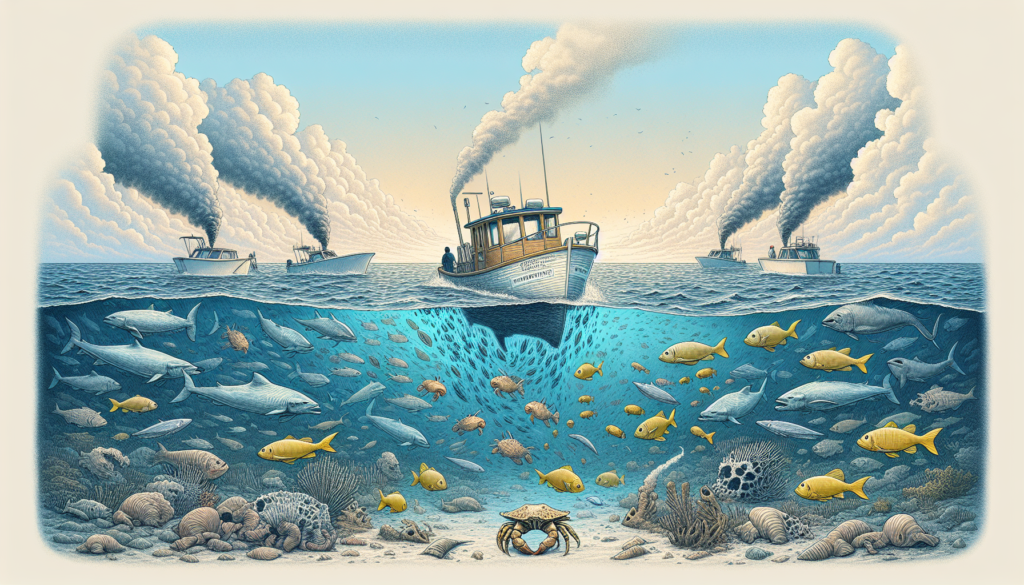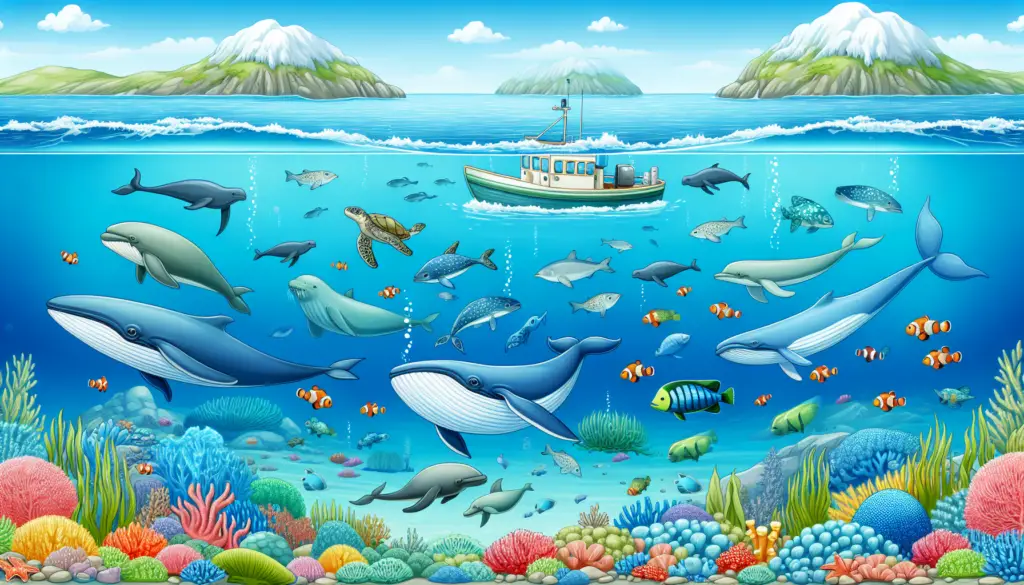Imagine you’re taking a peaceful trip in a boat, soaking in the serenity around you. Now, picture the constant roar of the boat engine, shattering that tranquility. Your journey through “Understanding the Effects of Noise Pollution from Boat Engines” will shed light on how this under-recognized environmental hazard on our waterways affects both aquatic wildlife and humans. The article unveils the toll that continuous exposure to boat engine noise takes on marine life, disrupting their communication, feeding habits and breeding grounds. It also explores the impact on humans, as the constant drone of engines disturbs the peaceful aura of oceans, getting in the way of a restful retreat. By educating yourself on this issue, you can make more informed choices and contribute to a quieter, friendlier environment for all who share our world’s waterways.

Defining Noise Pollution
Definition of noise pollution
Noise pollution doesn’t just refer to loud, overbearing sounds that damage your sense of hearing, it also includes noises that disrupt the natural rhythm of your life. Imagine trying to have some quiet time at home or trying to work, and constantly being disturbed by the sounds of loud music or the construction work in the distance? That’s exactly the kind of interruption noise pollution refers to.
Different sources of noise pollution
The sources of noise pollution are plentiful, ranging from industrial machinery, loudspeakers, and vehicle honking on roads to air crafts flying overhead, incessant playing of loud music, and so on. Noise pollution can occur both indoors as well as outdoors, and it has the capacity to negatively impact not just humans, but also the environment and the creatures within it.
Underlying reasons of it being an environmental concern
Noise pollution is of concern due to its widespread and growing impact on the environment. It’s among the many environmental stressors causing various psychological and physiological abnormalities, with potential long-term effects on wildlife. High noise levels can also disrupt wildlife communication, reproduction, and feeding habits, causing significant harm to ecosystems.
Boat Engines as a Key Source of Noise Pollution
Examining boats as major noise contributors
Along with the many other sources, boat engines contribute a big piece to the noise pollution pie. Motorboats, ships, and other water vessels generate noise through their engines and propulsion systems, producing underwater noise that travels far and wide.
Types of boats causing maximum sound pollution
Motorboats, cruise ships, and commercial vessels are among the chief contributors to sound pollution in our waters. Their large engines and propulsion equipment create significant underwater noise. Additionally, construction activities like offshore drilling and sonar also contribute to this form of pollution.
Why boat engines are major contributors to underwater noise pollution
Boat engines become significant contributors to underwater noise pollution due to the nature of sound propagation in water. Sound travels about 4.3 times faster in water than in air, and over much greater distances. So, noise created by boat engines does not just dissipate or fade away quickly; it travels extensively, causing continual disruption in marine environments.
Implication of Boat Engine Noise on Marine Life
Effects on the behavior of marine animals
Noise from boat engines can have serious implications for marine animals, causing changes in their behavior, stressing them out, and affecting their communication systems. For example, a marine animal may swim away from its usual territory to escape the noise—potentially getting lost, starving due to lack of food, or encountering new predators.
Impact on the breeding and feeding habits of marine life
The high levels of noise pollution in our oceans are not just causing discomfort to marine life, but also seriously disrupting their feeding, mating, and breeding habits. Studies have shown that noise pollution can make it difficult for marine species to find food or hear the calls of potential mates, thereby decreasing their ability to reproduce effectively.
Understanding bioacoustics: the communication system of marine species
Bioacoustics or the study of sound production and perception in animals is a key to understand how noise pollution impacts marine life. Animals use sound to communicate, locate food, find mates, and navigate. Noise pollution interferes with these signals, disrupting their natural behaviors and processes.

Understanding Sound Propagation Underwater
Propagation of sound in water versus air
Sound propagation in water differs from that in air mainly due to the properties of the medium. In water, sound waves can travel farther and faster, as compared to air. As a result, the noise generated by boat engines can spread over large areas underwater, impacting marine life over considerable distances.
Role of temperature and pressure in underwater sound propagation
The speed of sound in water is affected by three main factors: temperature, pressure, and salinity. Increase in pressure and temperature both lead to an increase in the speed of sound, allowing the noise from boat engines to travel faster and farther underwater.
How noise from boat engines travel long distances under water
Due to the properties of water and the effects of temperature and pressure, noise generated from boat engines can travel great distances underwater. The speed of sound combined with the reflective properties of the water surface and the sea floor contribute to the long-distance propagation of noise, causing widespread disturbance to marine life.
Long-term Effects of Boat Engine Noise on Ecosystems
Impact on biodiversity
Long-term exposure to noise from boat engines can disrupt marine biodiversity. Noise pollution can stress marine animals and interfere with their communication, feeding, and breeding behaviors, potentially leading to decreased populations and even extinction of certain species.
Emerging imbalances in marine ecosystem
The increasing noise levels in our oceans can create imbalances in the marine ecosystem. When species sensitive to noise are forced out of their habitats, it can lead to imbalances in the food chain and changes in the species compositions of these habitats.
Effects on commercial and recreational fisheries
Noise pollution can negatively impact commercial and recreational fisheries by disrupting the life cycles of fish. Changes in fish behavior due to noise may affect their feeding and breeding or push them out of their regular habitats, impacting fish stock levels in these areas.
Regulatory Measures and Noise Pollution Limits
Current policies targeting noise pollution
There are different noise pollution policies and regulations set up by different regions and countries to control noise pollution. Noise pollution standards are established for various sectors, including transportation, industries, and construction, to minimize their impact on the environment. However, the enforcement of these regulations often lacks rigor.
International regulations concerning noise pollution from boat engines
Internationally, the Marine Environment Protection Committee has established guidelines to reduce the impact of underwater noise from commercial shipping. There are mandates to make design changes in new vessels to minimize noise levels, and ongoing efforts to optimize routes to lessen the noise impact on sensitive areas.
Effectiveness of existing regulatory measures
While existing regulatory measures have made some progress in controlling noise pollution, their effectiveness can be limited by poor enforcement. Additionally, the focus of current regulations is primarily on reducing the loudest noises from the biggest vessels, overlooking the cumulative effects of smaller, but more numerous, noise sources.
Engineering Solutions to Reduce Noise Pollution from Boat Engines
Advances in boat engine design
Engineering advancements have offered several solutions to reduce noise pollution from boat engines. These include quiet ship designs and modified propeller technologies that reduce cavitation—the main source of vessel noise. Furthermore, electric propulsion technologies offer a quieter yet equally efficient alternative to traditional engines.
Tranquil underwater propulsion technologies
Another way to reduce underwater noise pollution is by using tranquil underwater propulsion technologies. This includes fuel cell systems, hybrid propulsion, and other forms of electric propulsion that are significantly quieter than conventional diesel engines. By replacing or supplementing conventional engines with these technologies, it’s possible to significantly reduce undersea noise pollution.
Possible modifications in the hull design to reduce noise
Hull design and propeller configurations can significantly affect the noise produced by a boat. Modifying the hull shape, using materials with better noise-damping properties, and configuring propellers to minimize noise-producing cavitation, are some ways to lower the noise emitted by boats.
Role of Marine Reserves in Buffering Noise Pollution
How marine reserves attenuate noise pollution
Marine reserves play an essential role in buffering noise pollution. By restricting shipping traffic and other noise-generating activities, marine reserves can provide relatively quiet habitats for marine fauna, safeguarding them from the harmful effects of underwater noise pollution.
Importance of quiet zones in marine reserves
Designated quiet zones within marine reserves are crucial as they offer vital protection to sensitive marine species threatened by noise pollution. These areas, free from the loud noises of boat engines, sonar, and other man-made sounds, provide a haven for marine species to thrive.
Effects of shipping restrictions in reserves on noise pollution
Shipping restrictions within marine reserves can effectively control noise pollution. By restricting the movement of commercial vessels, motorboats, and recreational watercraft, these reserves can significantly reduce noise levels and provide a healthier environment for marine species.
Public Awareness and Education on Noise Pollution
Need for increased awareness
Increasing public awareness about the problem of noise pollution, specifically from boat engines, is essential to solving the issue. Most people may be unaware of the impacts that noise pollution can have on marine life, biodiversity, and ecosystems as a whole. By educating them about these impacts, we can motivate them to adopt quieter boating practices and support policies that reduce noise pollution.
Approaches to educating the public about noise pollution
Public education about noise pollution can be done through various means, such as public service announcements, documentaries, interactive exhibits at museums, educational programs in schools, and awareness campaigns on social media. By using compelling and accessible information, these approaches can effectively inform and engage the public on this issue.
Role of public in mitigating boat engine noise pollution
The public plays a crucial role in mitigating boat engine noise pollution. By making conscious choices like opting for quieter boat engines, supporting policies targeted at reducing noise pollution, or advocating for noise-free marine reserves, they can contribute significantly to solving the problem of noise pollution.
Future Perspectives on Noise Pollution Control
Anticipated developments in policy and regulation
Looking ahead, we can anticipate increased attention and stricter regulations on noise pollution, specifically in the area of marine noise pollution. Considering the increasing awareness about the issue, policy changes and practical regulations to control noise pollution from boat engines can be expected.
Future research directions on boat engine noise and its effects
There’s immense scope for future research in understanding the full extent of the impact of boat engine noise on marine life and ecosystems. Researchers can focus on developing better noise measurement methods, studying the cumulative impacts of noise pollution on marine species, and exploring effective solutions to minimize such pollution.
Innovative technological solutions under development
Technological developments show great promise in the mitigation of boat engine noise pollution. From creating quieter boat engines to developing advanced sound-damping materials, several innovative solutions are currently under development. These emerging technologies hold the potential to significantly reduce noise pollution levels in our oceans in the future.


[…] you’re interested in eco-friendly boating, and you’re curious about electric boat engines. It turns out, these are substantially better for not only the environment but also your peace of […]
[…] traditional engines. These engines produce no emissions, resulting in better air quality and less noise pollution, making them ideally suited for use in sensitive marine […]
[…] recreational purposes, significantly contributes to the perils faced by endangered marine species. Noise pollution, physical disturbance and even direct strikes can cause severe harm or stress, affecting the […]